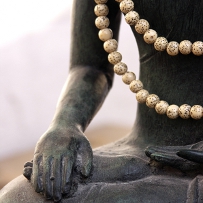|
|
|
|
|
 |

|

|

|
The greatest gift is the
gift of the teachings
|
|

|
| |
|
Dharma Talks
given at Spirit Rock Meditation Center
|
2020-05-27
From the Ordinary Habitual Mind to the Buddha-Mind 19: Transforming Reactivity 3
65:50
|
|
Donald Rothberg
|
|
|
After a review of our last two sessions exploring the nature of dukkha as reactivity and how to practice to transform reactivity, in the context of the Buddha's teachings of Dependent Origination and the Two Arrows, we explore a third aspect of practice. Some of our experiences of reactivity, particularly those in which there are repetitive and habitual patterns, sometimes open up to reveal old and relatively unconscious material, part of our "ignorance," giving us the chance to access and transform such material. This can occur, for example, when there is trauma, or when there are limiting beliefs originating from childhood (or sometimes later) related to psychological and/or social conditioning. A general model is given of four steps in the transformation of such material.
|
|
Spirit Rock Meditation Center
:
Monday and Wednesday Talks
|
|
|
|
|
|
|
|
|